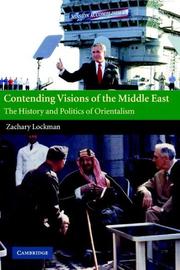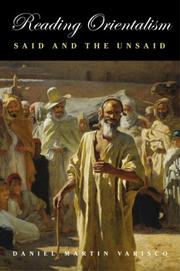| Listing 1 - 6 of 6 |
Sort by
|
Book
ISBN: 3845274344 384872829X 9783848728299 Year: 2018 Publisher: Baden-Baden: Nomos,
Abstract | Keywords | Export | Availability | Bookmark
 Loading...
Loading...Choose an application
- Reference Manager
- EndNote
- RefWorks (Direct export to RefWorks)
This book provides an insight into the transformation of the academic landscape in the aftermath of the Arab uprisings. It analyses how the academic discourse in and on the MENA region has changed and reflects on how the aforementioned transformation, which is still ongoing, is shaping lines of inquiry in different disciplines.
Education, Higher --- History --- Middle East --- Study and teaching. --- College students --- Higher education --- Postsecondary education --- Universities and colleges --- Education --- Education, Higher - Middle East - History - 21st century --- Arab Spring, 2010 --- -Middle East - Study and teaching --- -Middle East --- Arab Spring (2010-) --- 2000-2099

ISBN: 9780521629379 9780521620802 9780511606786 0521620805 0521629373 0511211465 9780511211461 0511213239 9780511213236 0511215045 9780511215049 0511216831 9780511216831 0511606788 1280540796 9781280540790 6610540799 9786610540792 051131552X Year: 2004 Volume: 3 Publisher: Cambridge, U.K. New York Cambridge University Press
Abstract | Keywords | Export | Availability | Bookmark
 Loading...
Loading...Choose an application
- Reference Manager
- EndNote
- RefWorks (Direct export to RefWorks)
Zachary Lockman's book offers a broad survey of the development of Western knowledge about Islam and the Middle East. Beginning with ancient Greek and Roman conceptions of the world, Lockman goes on to discuss European ideas about Islam from its emergence in the seventh century, with particular attention to the age of European imperialism, the era of deepening American involvement in this region, and the aftermath of the 9/11 terrorist attacks. Along the way, he explores how scholars and others in the West have studied and depicted Islam and the Middle East, focusing on the politics and controversies that have shaped Middle East studies in the United States over the past half century, including the debates over Said's influential critique, Orientalism. His book relates many of today's critical issues, including Muslim extremism, terrorism and United States policy in the Middle East, to their broader historical and political contexts. Zachary Lockman is Professor of Middle Eastern Studies and History at New York University and a member of the American Historical Association. He has been a Guggenheim fellow and Woodrow Wilson International Center for Scholars fellow. His work includes Comrades and Enemies (University of California Press, 1996), Workers and Working Classes in the Middle East, ed. (SUNY Press, 1993) and Workers on the Nile (Princeton, 1987).
History of Asia --- History of Africa --- Middle East --- Islam --- Orientalism. --- Study and teaching. --- Orientalisme --- Histoire --- Moyen-Orient --- Etude et enseignement --- Islam -- 20th century. --- Middle East -- Study and teaching. --- Orientalism --- Mohammedanism --- Muhammadanism --- Muslimism --- Mussulmanism --- Religions --- Muslims --- East and West --- Arts and Humanities --- History

ISBN: 9789004141537 9004141537 9786610867301 1429429240 9047406583 1280867302 143370787X 9781429429245 9781433707872 9789047406587 Year: 2005 Publisher: Leiden Boston Brill
Abstract | Keywords | Export | Availability | Bookmark
 Loading...
Loading...Choose an application
- Reference Manager
- EndNote
- RefWorks (Direct export to RefWorks)
Studies in the history and archaeology of the ancient and Islamic Near East greatly expanded and matured during the first half of the 20th century. Ernst Herzfeld (1879-1948), a pioneer in the archaeology, art history, and Persian language studies, significantly shaped this development. He excavated such key sites as Samarra, Paikuli, and Persepolis, and helped to define prehistoric and Islamic art. He became the world's first professor for Near Eastern archaeology in Berlin, adviser to Persia's government, and a member of the Institute for Advanced Study, Princeton. Scholars from a variety of disciplines reassess Herzfeld's wide-ranging contributions and situate them in their intellectual, academic and political frameworks. The book provides new insights into the historiography of archaeological and historical interpretations of the Near East, especially Iran, the German academic-political milieu of the first half of the 20th century, and the controversial figure of Ernst Herzfeld.
Herzfeld, Ernst, --- Middle East --- Study and teaching --- Hirtsfild, Irnist, --- Herzfeld, Ernst Emil, --- هرتسفلد، ارنست --- Asia, South West --- Asia, Southwest --- Asia, West --- Asia, Western --- East (Middle East) --- Eastern Mediterranean --- Fertile Crescent --- Levant --- Mediterranean Region, Eastern --- Mideast --- Near East --- Northern Tier (Middle East) --- South West Asia --- Southwest Asia --- West Asia --- Western Asia --- Orient --- Herzfeld, Ernst --- Congresses --- Herzfeld, Ernst. --- Herzfeld, Ernst, - 1879-1948 - Congresses --- Middle East - Study and teaching - Congresses --- Herzfeld, Ernst, - 1879-1948 --- Archaeologists --- Education. --- Children --- Education, Primitive --- Education of children --- Human resource development --- Instruction --- Pedagogy --- Schooling --- Students --- Youth --- Civilization --- Learning and scholarship --- Mental discipline --- Schools --- Teaching --- Training --- Historians --- History --- Education
Book
ISBN: 9783110374544 9783110376517 3110376512 9783110387278 3110387271 3110374544 3110372673 Year: 2016 Publisher: Berlin Boston
Abstract | Keywords | Export | Availability | Bookmark
 Loading...
Loading...Choose an application
- Reference Manager
- EndNote
- RefWorks (Direct export to RefWorks)
Over the past few decades, humanistic inquiry has been problematized and invigorated by the emergence of what is referred to as the digital humanities. Across multiple disciplines, from history to literature, religious studies to philosophy, archaeology to music, scholars are tapping the extraordinary power of digital technologies to preserve, curate, analyze, visualize, and reconstruct their research objects. The study of the Middle East and the broader Islamic world has been no less impacted by this new paradigm. Scholars are making daily use of digital tools and repositories including private and state-sponsored archives of textual sources, digitized manuscript collections, densitometrical imaging, visualization and modeling software, and various forms of data mining and analysis. This collection of essays explores the state of the art in digital scholarship pertaining to Islamic & Middle Eastern studies, addressing areas such as digitization, visualization, text mining, databases, mapping, and e-publication. It is of relevance to any researcher interested in the opportunities and challenges engendered by this changing scholarly ecosystem.
Islam --- Islamic civilization --- Digital humanities --- Study and teaching --- Computer network resources --- Middle East --- Civilization, Islamic --- Muslim civilization --- Civilization --- Civilization, Arab --- Mohammedanism --- Muhammadanism --- Muslimism --- Mussulmanism --- Religions --- Muslims --- Computer network resources. --- Asia, South West --- Asia, Southwest --- Asia, West --- Asia, Western --- East (Middle East) --- Eastern Mediterranean --- Fertile Crescent --- Levant --- Mediterranean Region, Eastern --- Mideast --- Near East --- Northern Tier (Middle East) --- South West Asia --- Southwest Asia --- West Asia --- Western Asia --- Orient --- Islam - Study and teaching - Computer network resources --- Islamic civilization - Computer network resources --- Middle East - Study and teaching - Computer network resources
Periodical
ISSN: 00370894 1988320X Year: 1941 Publisher: Madrid: CSIC,
Abstract | Keywords | Export | Availability | Bookmark
 Loading...
Loading...Choose an application
- Reference Manager
- EndNote
- RefWorks (Direct export to RefWorks)
Joden. --- Jodendom. --- Jews. --- Study skills. --- Jews --- Juifs --- Periodicals. --- Périodiques --- Middle East. --- Middle East --- Moyen-Orient --- Study and teaching --- Etude et enseignement --- 22 <05> --- Bijbel--Tijdschriften --- Periodicals --- Arts and Humanities --- History --- jews in Spain --- Sephardim --- Judaism --- cultural studies --- philology --- Hebrew --- How to study --- Learning, Art of --- Method of study --- Study, Method of --- Study methods --- Life skills --- Hebrews --- Israelites --- Jewish people --- Jewish question --- Jewry --- Judaic people --- Judaists --- Ethnology --- Religious adherents --- Semites --- Judaism --- Asia, Southwest --- Asia, Western --- Eastern Mediterranean --- Fertile Crescent --- Levant --- Mediterranean Region, Eastern --- Mideast --- Near East --- South West --- Southwest Asia --- Asia --- Asia, South West --- East (Middle East) --- Northern Tier (Middle East) --- South West Asia --- Orient --- Asia, West --- West Asia --- Western Asia --- Judaism. --- Eastern Mediterranean Region --- jews in spain --- sephardim --- judaism --- hebrew --- Sefardíes --- Sephardim --- Jews - Periodicals --- Middle East - Study and teaching - Periodicals. --- Jueus --- Cultura jueva --- Sefardites --- Història

ISBN: 9780295987521 9780295987583 0295987588 0295987529 0295802626 Year: 2007 Publisher: Seattle (Wash.) : University of Washington press,
Abstract | Keywords | Export | Availability | Bookmark
 Loading...
Loading...Choose an application
- Reference Manager
- EndNote
- RefWorks (Direct export to RefWorks)
The late Edward Said remains one of the most influential critics and public intellectuals of our time, with lasting contributions to many disciplines. Much of his reputation derives from the phenomenal multidisciplinary influence of his 1978 book Orientalism. Said's seminal polemic analyzes novels, travelogues, and academic texts to argue that a dominant discourse of West over East has warped virtually all past European and American representation of the Near East. But despite the book's wide acclaim, no systematic critical survey of the rhetoric in Said's representation of Orientalism and the resulting impact on intellectual culture has appeared until today. Drawing on the extensive discussion of Said's work in more than 600 bibliographic entries, Daniel Martin Varisco has written an ambitious intellectual history of the debates that Said's work has sparked in several disciplines, highlighting in particular its reception among Arab and European scholars. While pointing out Said's tendency to essentialize and privilege certain texts at the expense of those that do not comfortably it his theoretical framework, Varisco analyzes the extensive commentary the book has engendered in Oriental studies, literary and cultural studies, feminist scholarship, history, political science, and anthropology. He employs "critical satire" to parody the exaggerated and pedantic aspects of post-colonial discourse, including Said's profound underappreciation of the role of irony and reform in many of the texts he cites. The end result is a companion volume to Orientalism and the vast research it inspired. Rather than contribute to dueling essentialisms, Varisco provides a path to move beyond the binary of East versus West and the polemics of blame. Reading Orientalism is the most comprehensive survey of Said's writing and thinking to date. It will be of strong interest to scholars of Middle East studies, anthropology, history, cultural studies, post-colonial studies, and literary studies.
Saïd, Edward Wadie, --- Geschiedenis van Azië --- 950 Geschiedenis van Azië --- East and West --- Orientalism --- 82:32 --- 950 --- Civilization, Western --- Civilization, Oriental --- Occident and Orient --- Orient and Occident --- West and East --- Eastern question --- 82:32 Literatuur en politiek --- Literatuur en politiek --- Asian influences --- Oriental influences --- Western influences --- Said, Edward W. --- Asia --- Middle East --- Study and teaching. --- Study and teaching --- East and West. --- Orientalism. --- Orientalisme --- --Orient et Occident --- --Asie --- --Étude et enseignement --- --Moyen-Orient --- --Saïd, Edward Wadie, --- 950 History of Asia --- History of Asia --- Said, Edward Wadie --- Orient et Occident --- Étude et enseignement --- Saïd, Edward Wadie, - 1935-2003 - Orientalism --- Saïd, Edward Wadie, 1935-2003 --- Asie --- Moyen-Orient --- Asia - Study and teaching --- Middle East - Study and teaching --- Asie dans la litterature --- Orient et occident
| Listing 1 - 6 of 6 |
Sort by
|

 Search
Search Feedback
Feedback About UniCat
About UniCat  Help
Help News
News